WITNESS RADIO MILESTONES
What Minister Nantaba told the Land Commission of Inquiry?
Published
7 years agoon
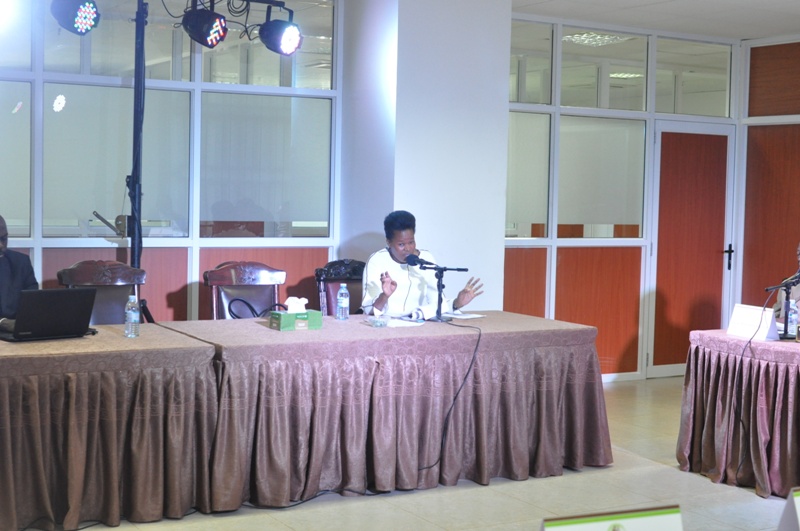
Ida Nantaba, is a former State Minister in charge of Lands now holding the portfolio of Minister of State for ICT and National Guidance.
On May 25, Nantaba appeared before the commission of inquiry into land acquisition and management headed by Court of Appeal judge Catherine Bamugemereire.
The commission is also inquiring into the effectiveness of law, policies and processes of land acquisition, land administration, land management and land registration in the country.
Due to critical matters, Minister Nantaba raised before the committee detailing how ever-increasing land grabs are planned by big shots in government, aided by government institutions-like police, army ministry of lands, witnessradio.org finds it fit to bring you the session verbatim, and below are excerpts:
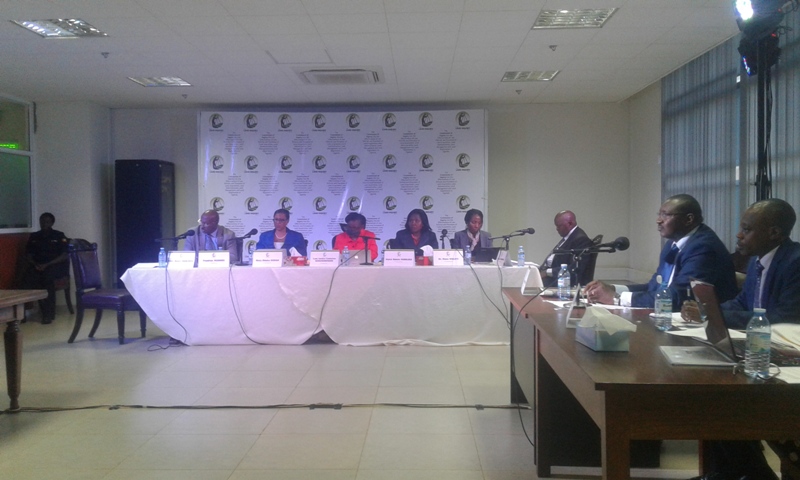 Albert Byenkya (lead counsel, commission): Please state your name, age and residence.
Albert Byenkya (lead counsel, commission): Please state your name, age and residence.
Nantaba: Thank you, my names are Aida Nantaba, I am the Member of Parliament and women representative for Kayunga District. I am the minister of State for ICT and National Guidance.
Byenkya: The reason why you were invited is because you were a minister of State for Lands and the commission wants to benefit from your experiences as a minister. During what period did you served in the ministry of Lands?
Nantaba: That was from 2012 December to 2016 June.
Byenkya: Approximately three years or so.
Nantaba: Yes.
Byenkya: Can you please describe what your mandate was at the time of your office.
Nantaba: I want to refer to the notice of appointment of the committee on illegal eviction that was issued by the President of Uganda and it was published in the Uganda gazette on the May 27, 2013. The terms of reference were mainly five and I will attach a copy on the memorandum which I will furnish the commission.
Our terms of reference are: we were supposed to identify, investigate and return tenants by occupancy and landlords who had been evicted illegally; number two, we were supposed to identify persons involved in illegal land evictions for purposes of prosecution and compensation of victims; three was to sensitise tenants and landowners on their rights and obligations and initiate the process of issuing certificates of occupancy; four was to assist land owners with authenticated eviction orders to execute them and number five was to implement presidential directives as comprised in his statement which was issued on February 2, 2013
Byenkya: What was your experience? How did this committee function? How successful was it in its terms of reference?
Nantaba: I would want to focus on three main areas: that is land administration, registration and management. Those three are the main areas that need to be looked at when we look at land ownership. Land ownership in regard to mailo land, freehold, leasehold and customary occupancy.
Once the three areas are abused or mismanaged, then land disputes crop up. I want to interest the commission into seven issues that surround the three areas that are violated.
Byenkya: Yes proceed.
Nantaba: In Uganda, we have overlapping land rights or land interests. You find a Kibanja owner and the land owner on the same piece of land yet each of them claim rights of occupancy and rights to use and develop that very land and what government has done was to introduce the land fund to solve these overlapping rights. Now land has become a commercial commodity, it is a tradable item where we have so many property agents coming up.
In the past we had landlords that accommodated Bibanja owners but of late someone gets registered on land but because he is not collecting the Busuulu (nominal ground rent), he feels like he is not using the land and therefore not benefiting anything. So he disposes off the land to the present landlord who has turned out to be property agents and these ones look at land as tradable item.
They would start parceling it out in small pieces and then sell it out and don’t accommodate the Kibanja owner who has been sitting on this land for ages. In introducing the National Land policy that now is giving a leeway to partition of land between land owners and the Bibanja owners, sometimes these are two unequals of the land owner and Kibanja owner where the later is not given a chance to say, out of my eight acres I remain with say six instead this property agent who is the new landlord dictates on how many acres, the Kibanja owner will remain with.
So land becoming the hottest commodity on the market today is exposing these Bibanja owners to people who don’t accommodate them as other people with interest on land and therefore just want to take their land without …
Byenkya: May be you will get to recommendations later, but how do we resolve these issues if the land policy is saying lets partition. If you leave it to anybody to negotiate then you will never solve the problem. Is there a way we can find a formula that works, that everybody can accept.
Nantaba: I would want to come to that later because it is one of the issues that would come later. But I was explaining that what is now fuelling land disputes are the overlapping land rights over the same piece of land where we have a Kibanja interest vis-à-vis a landlord who looks at land as another commodity for sale and leaves the Kibanja owner in abeyance.
We have an issue of speculators. Today, the discovery of oil in Uganda is one of the main reasons why disputes are rising. Some people heard, I don’t know from where that Kayunga has oil and so many big people rushed to acquire land in speculation that there is oil. You have seen what happened in Hoima, the entire Bunyoro region is suffering. Land grabbing is very rampant with a view that there is oil and so they anticipate that when compensation is due, they will be the ones to benefit.
Speculation is fuelling land disputes in this country where we are supposed to construct roads, officers in the ministry of Works together with the officers in the ministry of Lands, because they are the ones who know about the project, they rush and acquire land from whoever is sitting on that particular land and remember this is already a price doubled. When they are requesting for payment, they exaggerate the prices and, therefore, exorbitant prices become very difficult for government to compensate and make it difficult for government programmes to be implemented.
The other issue is the introduction of the land fund which I have talked about. I have also realised that some landlords are acquiring big chunks of land that are heavily occupied by tenants in anticipation that when the land fund is availed, they will be the ones to get the biggest share. I have an experience where one of the big persons in government at that time when I was fighting land grabbing and illegal land evictions, rang me and told me that the best thing for me to do is to convince the President to make sure that there is money in the land fund but “instead you think that you will just return land back to evictees. You rather put money and we pay off these landlords”.
But this is land which was grabbed and the title had been fraudulently acquired and the tenants illegally evicted and he is telling me to make sure that the President puts more money in the land fund and we just compensate this man and he goes away. So land fund is another area of speculation where people think that once money is there then we can acquire land which is fully occupied and then we shall compensate from that fund. Its availability has two areas that need to be looked at; the positive part of it and the other part where it is taken advantage of.
Then we have fraud in Land Registration Department. This is wide and I don’t think I will be able to expound fully because it takes various areas where records in the Land Registration Department are tampered with. You find the blue page that reads Nantaba is already changing to a different person and the white page will still be changed because consequently both of them will have to read different details. So when you come with your title, sometimes you are told that is fraudulent one even when it is a genuine title but because they have tampered with the records, your genuine title will be trashed away and you will be deprived of the rights to own land.
Fraud takes multiple land titling. You have heard land where we have various land titles, many of them but describing one single parcel of land.
That fuels land disputes. We have illegal sub divisions; you have a title which has 300 acres but someone sub divides your land, a surveyor and when you come to complain, they tell you that you actually had 100 acres and not 300, so bring that title and we amend the register and we give your title of 100 acres not the 300 that you knew of. This is in the Department of Mapping and Surveys.
We have caveats that are dislodged without the consent of the caveator. You lodge a caveat but you realise someone has a title even when you had lodged a caveat and because the registrar has powers to amend a register sometimes without notifying you, the caveat is dislodged and therefore they transact on your land without your consent.
Sometimes district land boards deny sitting tenant’s opportunity to acquire registrable interests. Many of these know because we tried to sensitise them during our committee operations that you can as well acquire title on the land which you occupy, especially when it is public land. Now when they try to apply, they are denied a chance to be registered because someone with more money is interested in the same land.
There are areas where former leases are denied a chance to renew their leases and I will give examples in my memorandum. We have cases where plot numbers change and when you come to complain to the registrars that are responsible for that, they tell you that title is not there or that land is in Mubende and Kayunga when actually that is your land.
We have registrars who fail to implement court orders. Court delivers judgment in favour of a person to amend the register and the registrar refuses to enter you on title and when they are held accountable they say they have never received this judgment.
We have forged letters of administration instruments. You forge letters of administration and then you are entered on a title and when you request the registrar to amend the register, yours is trashed. Therefore, we have forged documents that are used during the registration process and all this is fuelling land disputes.
We have the influx of investors into this country and quack investors. Quack investors in the sense that we saw people who were obtaining licences for instance to grow sugar but have no land to grow sugarcane and therefore would want to come and influence district land boards.
I will attach minutes where district land boards, a secretary and chairperson sit and sign on reports by area land committees even when the physical work on ground is not done. These are the minutes that they wave in our land offices, they acquire titles upon them and they come and say this is our land.
You ask for a survey report, it is not there, no deed plan, no physical survey done but they are waving a title. And when you try to interrogate, they would want to pay you off such that they shut your mouth up, leave the rest (eviction) to them because they can handle.
Our district land boards are not trained. We appoint chairpersons who have no knowledge in land administration issues; you don’t train and facilitate them. Area land committees are comprised of members that are picked from the community without any knowledge and when you bring documents, they will just append signatures as long as there is payment because it is the applicant who puts them in his car and tells them ‘I want this land and pays’ Government is not paying and you know what this person will do, there is no reason to hesitate to sign an area land committee that shows there are no tenants on land.
Byenkya: As a minister, you must have interacted with the Office of Registrar of Titles, you describe these incidences of malpractices on the part of the registrar of titles. How wide spread is this in the Office of the Registrar of Titles
Nantaba: I would just say that this is enormous because cases that were reported on a daily basis while we were dealing with issues of land evictions were all surrounded by fraud. It is fraud
Byenkya: Does the officers in the registrar of titles participating?
Nantaba: Yes. The registrar of titles, especially the commissioner-land registration has excessive powers.
When you look at the Registration of Titles Act (RTA), they have more powers, which they end up abusing. So they are directly involved in issuing these fraudulent land titles. It is to them you complain and it is upon them to amend the register and when he detects this fraud and refuses to amend the register that means he is directly involved.
Byenkya: Do you think that this office, apart from the powers that they have, the question of legal liability for the actions that they take the legal framework holds them liable for their actions?
Nantaba: No. The RTA for instance gives them power to register. Section 175 of the RTA gives the registrar of titles excessive powers and Section 181, whatever they do during the process, they are not held liable, they even have powers to amend the register without prior consultation of courts of law. Any time they can cancel out an entry, they can enter, and I actually recommend that there is need to review the RTA because it gives excessive powers without holding them accountable for their actions.
Byenkya: Next issue.
Nantaba: The next issue is on the drivers of land disputes. During the committee’s operation, we had to work with institutions like police, courts of law, local governments, officers in the administrator general’s office, district land boards, offices of lands, and many institutions involved in the registration of land processes.
We realised that one of the drivers is the involvement of the institutions that are supposed to be helping in executing the mandates in the land related laws.
Police for instance, we realised that police aides and abets evictions. I will give a scenario in Kayunga where one landlord acquired land in 2008 through fraudulent means. Land was occupied by more than 1,000 people and he swings in with police escorted by the army.
They start assaulting these tenants who were legal occupants, they arrested them, imprisoned them, those who were hesitant and resisting eviction were dragged to courts of law and criminal offences were preferred against them instead of civil cases.
Someone is accused of stealing goats, hitting a cow because they had to bring in as more cows as possible to destroy their crops, demolished their houses, burnt some and some are even still in prison for more than seven years now. And I would want to escort this commission to these prisons and you see these prisoners.
We tried as a committee to rescue as many as possible but many of them are there because they were charged with aggravated robbery. A man who has never touched a gun is charged with aggravated robbery and proving that we would go to courts and listen, but these are people imprisoned before I became chairperson of the committee.
Byenkya: In the case of Kayunga, was there a court order involved?
Nantaba: No court order, even the title was still in the process of being acquired because at this time registrars had started changing details on the title and this man says “I am the owner of this land”, but the landlord is there and these people know him and during this scuffle, both the landlord and the masquerader are in court but evictions are happening on ground.
When others are thrown in courts and in prisons and assaulted, the rest on ground are intimidated and end up leaving even before suffering what the others have faced. The involvement of police in aiding these land grabbers fuels land disputes because they side with others and leave the other party to suffer.
Some of us leaders in connivance with the offices of the RDCs, we also side with some parties and don’t listen to others; sometimes we are bribed. I saw bribes coming daily, “Nantaba get this and shut up, leave the rest to me to handle.”
So you either shut up by a bribe or you fear the person who is evicting because of his position in the army, police, in government, whether he is a minister, the position he is attached to, you just keep your hands off. So you keep quiet as he is evicting people.
Byenkya: Most of these evictions are carried out by highly placed people in various government agencies?
Nantaba: Absolutely. The kind of generals in the army, big people in police, sometimes us ministers, there was a time when I had to face my very Attorney General then, he was attempting to evict some people and I am the chairperson of the committee on illegal land evictions and he is supposed to cover me up in case of any litigation and I am telling him to not evict the people and he is supposed to cover me up in court. This is the level at which sometimes people back off and keep quiet and leave the peasants to suffer because of the person involved and the position he holds in government.
Byenkya: What was the relationship between the committee and other land disputes mechanisms such as courts of law? What laws were you supposed to use under your mandate?
Nantaba: At one time we had to suspend the operations of the committee for lack of a legal framework within which the committee was supposed to operate and at that time I was sued in my individual capacity as Nantaba and not as minister or chairperson of the committee.
This happened several times to an extent that cases were decided against me and I have lost salary to that effect to a tune of more than Shs100 million because myself and the Attorney General, things were sore. I intervened in a case where he was involved, stopping him from evictions and, therefore, there was no any representation in courts of law.
The office which was supposed to cover up neglected us and sometimes we would receive injunctions stopping us from visiting a locus like a case in Mubende. We wrote to the RDC that we were visiting an area and this man rushed to court to stop us from visiting and we were stopped and surprisingly he applied for costs and government could pay damages.
Related posts:
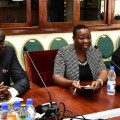
 Gov’t officials top land grabbers list –Land Commission
Gov’t officials top land grabbers list –Land Commission
 Minister Betty Amongin Pinned Before The Land Inquiry Commission
Minister Betty Amongin Pinned Before The Land Inquiry Commission
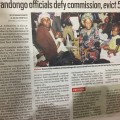 Kiryandongo District Authorities are on spot by the commission of inquiry into land matters
Kiryandongo District Authorities are on spot by the commission of inquiry into land matters
You may like
DEFENDING LAND AND ENVIRONMENTAL RIGHTS
Breaking: Witness Radio and Partners to Launch Human Rights Monitoring, Documentation, and Advocacy Project Tomorrow.
Published
5 months agoon
February 21, 2024
By Witness Radio Team.
Witness Radio, in collaboration with Dan Church Aid (DCA) and the National Coalition for Human Rights Defenders (NCHRD), is set to launch the Monitoring, Documentation, and Advocacy for Human Rights in Uganda (MDA-HRU) project tomorrow, 22nd February 2024, at Kabalega Resort Hotel in Hoima District.
The project, funded by the European Union, aims to promote the protection and respect for human rights, and enable access to remedy where violations occur especially in the Mid-Western and Karamoja sub-regions where private sector actors are increasingly involved in land-based investments (LBIs) through improved documentation, and evidence-based advocacy.
The three-year project, which commenced in October 2023, focuses its activities in the Mid-Western sub-region, covering Bulisa, Hoima, Masindi, Kiryandongo, Kikuube, Kagadi, Kibale, and Mubende districts, and Karamoja sub-region, covering Moroto, Napak, Nakapiripirit, Amudat, Nabilatuk, Abim, Kaabong, Kotido, and Karenga districts.
The project targets individuals and groups at high risk of human rights violations, including Human Rights Defenders (HRDs) and Land and Environmental Defenders (LEDs). It also engages government duty bearers such as policymakers and implementers in relevant ministries and local governments, recognizing their crucial role in securing land and environmental rights. Additionally, the project involves officials from institutional duty bearers including the Uganda Human Rights Commission (UHRC), Equal Opportunities Commission, and courts, among others.
Representatives from the international community, faith leaders, and business actors are also included in the project’s scope, particularly those involved in land-based investments (LBIs) impacting the environment.
The project was initially launched in Moroto for the Karamoja region on the 19th of this month with the leadership of the National Coalition for Human Rights Defenders (NCHRD).
According to the project implementors, the action is organized into four activity packages aimed at; enhancing the capacity and skills of Human Rights Defenders (HRDs) and Land and Environmental Defenders (LEDs) in monitoring, documentation, reporting (MDR), and protection, establishing and reinforcing reporting and documentation mechanisms for advocacy and demand for corporate and government accountability; providing response and support to HRDs and marginalized communities; and lastly facilitating collaboration and multi-stakeholder engagements that link local and national issues to national and international frameworks and spaces.
Related posts:

 Breaking: over 350,000 acres of land were grabbed during Witness Radio – Uganda’s seven months ban.
Breaking: over 350,000 acres of land were grabbed during Witness Radio – Uganda’s seven months ban.
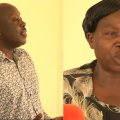 Kiryandongo leadership agree to partner with Witness Radio Uganda to end rampant forced land evictions in the district.
Kiryandongo leadership agree to partner with Witness Radio Uganda to end rampant forced land evictions in the district.
 Human Rights Defenders not safe in Uganda – Unwanted Witness report
Human Rights Defenders not safe in Uganda – Unwanted Witness report
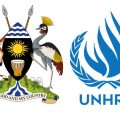 Breaking Alert: Uganda passes the National Action Plan (NAP) on Business and Human Rights
Breaking Alert: Uganda passes the National Action Plan (NAP) on Business and Human Rights
DEFENDING LAND AND ENVIRONMENTAL RIGHTS
Kiryandongo leadership agree to partner with Witness Radio Uganda to end rampant forced land evictions in the district.
Published
7 months agoon
January 4, 2024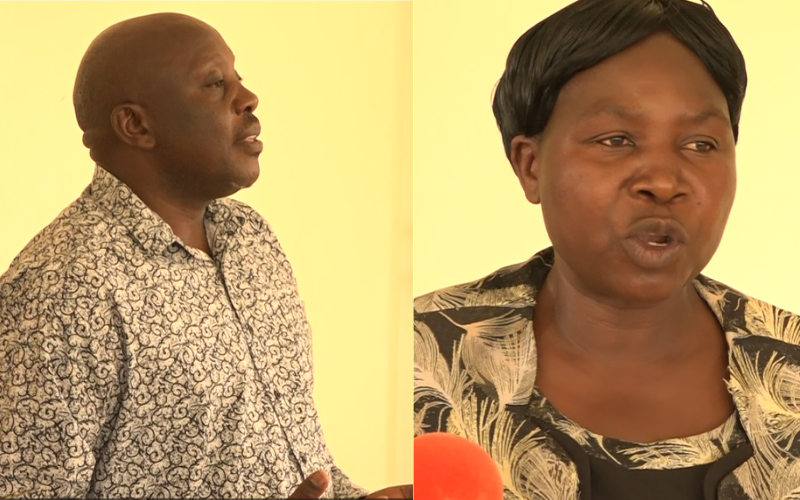
By Witness Radio team.
Kiryandongo district leaders have embraced Witness Radio’s collaboration with the Kiryandongo district aimed at ending the rampant violent and illegal land evictions that have significantly harmed the livelihoods of the local communities in the area.
The warm welcome was made at the dialogue organized by Witness Radio Uganda, Uganda’s leading land and environmental rights watchdog at the Kiryandongo district headquarters, intended to reflect on the plight of land and environmental rights defenders, local and indigenous communities and the role of responsible land-based investments in protecting people and the planet.
Speaking at the high-level dialogue, that was participated in by technical officers, policy implementers, religious leaders, leaders of project affected persons (PAPs), politicians, media, Civil Society Organizations (CSOs), and development partners that support land and environment rights as well as the Land Based Investments (LBIs) Companies in the Kiryandongo district, the leaders led by the District Local Council 5 Chairperson, Ms. Edith Aliguma Adyeri appreciated the efforts taken by Witness Radio organization to organize the dialogue meeting aimed at bringing together stakeholders to safeguard community land and environmental rights in order address the escalating vice of land grabbing in the area.
During the dialogue, participants shared harrowing accounts of the impacts of land evictions and environmental degradation, including tragic deaths, families torn asunder, young girls forced into marriage, a surge in teenage pregnancies, limited access to education, and significant environmental damage which have profoundly affected the lives of the local population in Kiryandongo.
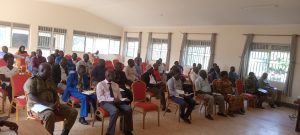
Participants attending the dialogue.
In recent years, Kiryandongo district has been embroiled in violent land evictions orchestrated to accommodate multinational large-scale agriculture plantations and wealthy individuals leaving the poor marginalized.
According to various reports, including findings from Witness Radio’s 2020 research Land Grabs at a Gun Point, the forceful land acquisitions in Kiryandongo have significantly impacted the livelihoods of local communities. It is estimated that nearly 40,000 individuals have been displaced from their land to make room for land-based investments in the Kiryandongo district. However, leaders in the district also revealed in the dialogue that women and children are affected most.
The Kiryandongo Deputy Resident District Commissioner, Mr. Jonathan Akweteireho, emphasized that all offices within the Kiryandongo district are actively involved in addressing the prevalent land conflicts. He also extended a welcome to Witness Radio, acknowledging their collaborative efforts in tackling and resolving land and environmental issues in the district.
“Ladies and gentlemen, we all know that the land rights together with environmental rights have been violated in our district, but because we don’t know what our rights are, because we have not directly done what we could to safeguard our rights and now this is the time that Witness Radio has brought us together to safeguard our rights. I want to welcome you in Kiryandongo and be rest assured that we shall give you all the necessary support to help us manage these rampant cases,” Ms. Adyeri said in her remarks during the dialogue meeting.
The team leader at Witness Radio Uganda, Mr. Geoffrey Wokulira Ssebaggala expressed gratitude to the participants for their active involvement in the dialogue and revealed that Witness Radio’s objective is to find a holistic solution to the escalating land disputes in Kiryandongo district serving as an example to other districts.
“We are here to assist Kiryandongo district in attaining peace and stability because it stands as a hotspot for land grabbers in Uganda. Mismanagement of land conflicts in Uganda could potentially lead to a significant internal conflict. Everywhere you turn, voices are lamenting the loss of their land and property. Kiryandongo, abundant with ranches, suffers from a lack of a structured framework, which amplifies these land conflicts. The influx of wealthy investors further complicates the situation,” Mr. Ssebaggala disclosed.
Within the dialogue, Mr. Ssebaggala emphasized the need for the Kiryandongo district council to pass a by-law aimed at curbing land evictions as an initial step in addressing the prevalent land injustices.
Related posts:
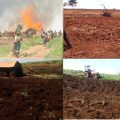
 Breaking: over 350,000 acres of land were grabbed during Witness Radio – Uganda’s seven months ban.
Breaking: over 350,000 acres of land were grabbed during Witness Radio – Uganda’s seven months ban.
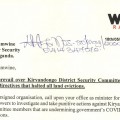 Why Are Evictions Still Happening In Kiryandongo: Witness Radio Petitions Government.
Why Are Evictions Still Happening In Kiryandongo: Witness Radio Petitions Government.
 Uganda: Targeting community land and environmental defenders with criminal offenses is rising as two community land rights defenders arrested in a hotspot district of forced land evictions.
Uganda: Targeting community land and environmental defenders with criminal offenses is rising as two community land rights defenders arrested in a hotspot district of forced land evictions.
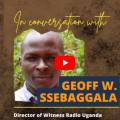 The Executive Director of Witness Radio Uganda talks about the role played by Witness Radio in protecting communities affected by large-scale agribusinesses in Kiryandongo district in an interview with the ILC.
The Executive Director of Witness Radio Uganda talks about the role played by Witness Radio in protecting communities affected by large-scale agribusinesses in Kiryandongo district in an interview with the ILC.
WITNESS RADIO MILESTONES
Kiryandongo authorities decry rising cases of land disputes
Published
7 months agoon
January 3, 2024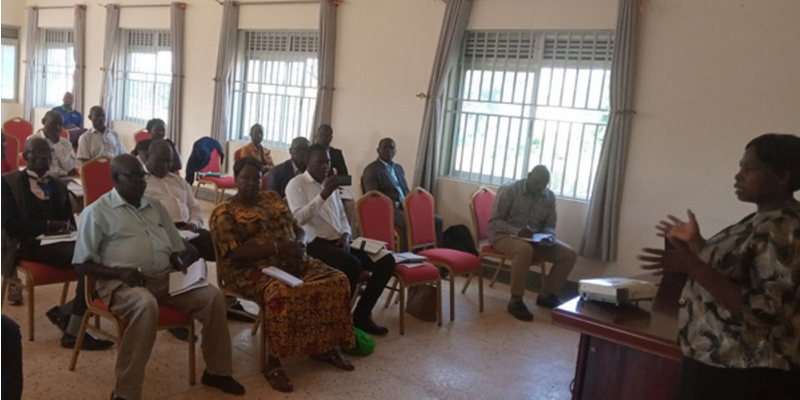
The LC5 chairperson of Kiryandongo, Ms Edith Aliguma Adyeri, has saidnland dispute has impacted on people’s lives, dignity and children’s education in the district.
Just like other parts of Uganda, conflicts over land in Kiryandongo arise when individuals – who often are blood relatives – compete for use of the same parcel of land or when members of the community lay claim over ownership of unutilised government land.
Ms Adyeri further said land and environmental rights affect people both directly and indirectly, “and we are not hearing it from afar. It is already together with us [here], it has already affected us!”
She was speaking at a meeting which sought to discuss alternative remedies to salvage the appalling land and environmental rights situation in Kiryandongo at the district headquarters on Thursday.
The one-day dialogue was aimed at reflecting on the plight of land and environmental rights defenders, local and indigenous communities and the role of responsible land-based investments in protecting people and the planet.
It was attended by private companies, members of civil society and local government officials and organised by Witness Radio – an advocate for land and environmental rights in Uganda – in partnership with Oxfam, and Kiryandongo District leadership.
“Some people have even died, families are broken up, and brothers are not seeing eye-to-eye because of land rights. Access to justice is equally becoming very difficult because when you hire one lawyer that
lawyer will talk to learned friends, and they agree. They leave you in suspense,” Ms Adyeri said.
According to her, some children have not accessed education because of land and environmental rights.
Mr Jonathan Akweteireho, the deputy Resident District Commissioner of Kiryandongo, said enlightened people especially should be sensitive to the historical injustice of this area.
“We can never handle the Bonyoro land question without thinking about that history. It will be an injustice to the incomers, to the government and to the leaders who don’t understand,” he said.
“We had 38 ranches here which on the guidance of these international organisations, especially the World Bank, the government restructured them, allowing people to settle there, they were never given titles and up to today, there are big problems in all those ranches,” he added.
Mr Jeff Wokulira Ssebaggala, the executive director of Witness Radio, said that a well-functional land sector supports land users or holders and investors, reduces inefficiencies and provides mechanisms to resolve land disputes.
Mr David Kyategeka, the secretary to the Kiryandongo District Land Board, said the issue of land rights is very clear but the major challenge has been sensitising the locals to know what rights he or she expects to enjoy out of this very important resource.
Source: www.monitor.co.ug
Related posts:
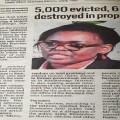
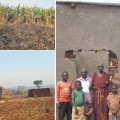 Witnessradio.org’s Petition to Land Inquiry Commission over Human rights in Kiryandongo district
Witnessradio.org’s Petition to Land Inquiry Commission over Human rights in Kiryandongo district
 Kiryandongo District Authorities are on spot by the commission of inquiry into land matters
Kiryandongo District Authorities are on spot by the commission of inquiry into land matters
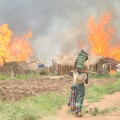 Land grabs victims in Uganda meet amid escalating cases of illegal evictions and rights violations
Land grabs victims in Uganda meet amid escalating cases of illegal evictions and rights violations
 Uganda: Targeting community land and environmental defenders with criminal offenses is rising as two community land rights defenders arrested in a hotspot district of forced land evictions.
Uganda: Targeting community land and environmental defenders with criminal offenses is rising as two community land rights defenders arrested in a hotspot district of forced land evictions.

Oil activities in Murchison Falls National Park threaten Wildlife Conservation – AFIEGO study reveals.

A Financial gap: Can China be stopped from financing the EACOP?

NEMA suspend operations to evict the World Bank project-affected community and other residents accused of being located in wetlands.

Farmers count losses as dry spell scorches maize gardens

Sexual violence as a tool to grab land: a local woman accuses industrial agriculture investor Agilis Partners Limited of sexual violence.

Thirty-six (36) groups from all over the world have written to industrial agriculture investors, Agilis Partners Limited to stop human rights violations/abuses against thousands of indigenous/local communities, settle grievances, and return the grabbed land.

CSOs, oil host communities, and concerned citizens have petitioned the President of Uganda to stop oil drilling in the Murchison Falls National Park.

Enemies of the State: Resistance to the EACOP becomes a deadly task

Innovative Finance from Canada projects positive impact on local communities.
Over 5000 Indigenous Communities evicted in Kiryandongo District
Petition To Land Inquiry Commission Over Human Rights In Kiryandongo District
Invisible victims of Uganda Land Grabs
Resource Center
Legal Framework
READ BY CATEGORY
Newsletter
Trending
-
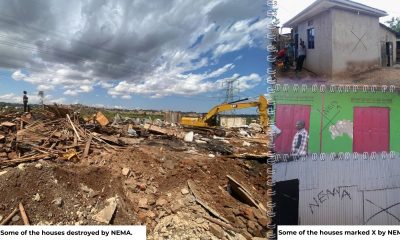
 MEDIA FOR CHANGE NETWORK5 days ago
MEDIA FOR CHANGE NETWORK5 days agoNEMA suspend operations to evict the World Bank project-affected community and other residents accused of being located in wetlands.
-

 FARM NEWS2 weeks ago
FARM NEWS2 weeks agoStrengthening Small-Scale Farming in Uganda through Farmer Field Schools.
-

 MEDIA FOR CHANGE NETWORK2 days ago
MEDIA FOR CHANGE NETWORK2 days agoOil activities in Murchison Falls National Park threaten Wildlife Conservation – AFIEGO study reveals.
-
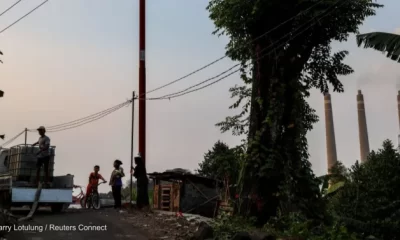
 NGO WORK1 week ago
NGO WORK1 week agoThe mothers and daughters of the global south cannot celebrate the World Bank’s 80-year legacy of harm.
-
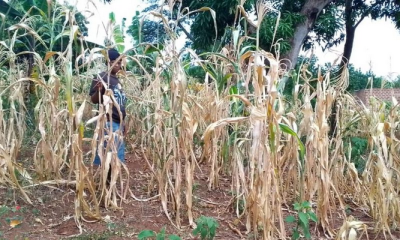
 FARM NEWS5 days ago
FARM NEWS5 days agoFarmers count losses as dry spell scorches maize gardens
-
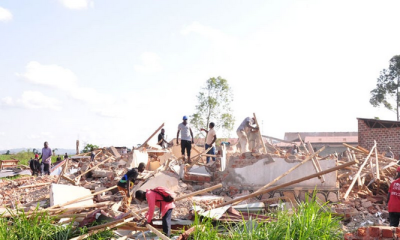
 MEDIA FOR CHANGE NETWORK5 days ago
MEDIA FOR CHANGE NETWORK5 days agoNEMA hindering environment restoration in Wakiso – leaders
-
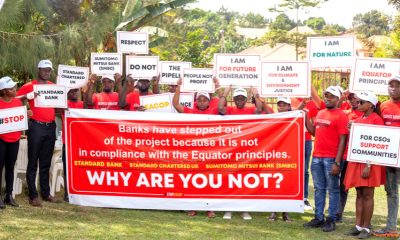
 MEDIA FOR CHANGE NETWORK3 days ago
MEDIA FOR CHANGE NETWORK3 days agoA Financial gap: Can China be stopped from financing the EACOP?
